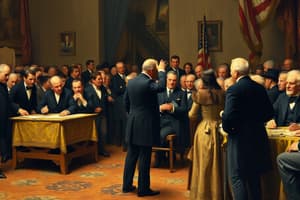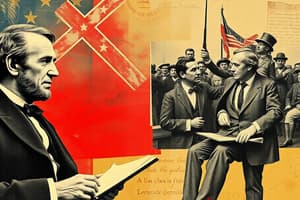Podcast
Questions and Answers
What was the main reason Southern Democrats denied Stephen A. Douglas the presidential nomination?
What was the main reason Southern Democrats denied Stephen A. Douglas the presidential nomination?
- His radicalism
- His support for popular sovereignty
- His opposition to the Lecompton constitution (correct)
- His experience as a governor
The Democratic Party required a two-thirds majority of delegates for a presidential nomination since 1860.
The Democratic Party required a two-thirds majority of delegates for a presidential nomination since 1860.
False (B)
Who were the founders of the League of United Southerners?
Who were the founders of the League of United Southerners?
William L. Yancey and Edmund Ruffin
The Constitutional Union Party nominated ______ for president.
The Constitutional Union Party nominated ______ for president.
What was the nickname of the building where the Republican convention was held?
What was the nickname of the building where the Republican convention was held?
Which states were considered crucial for the Republican Party to win the presidency in 1860?
Which states were considered crucial for the Republican Party to win the presidency in 1860?
William H. Seward was the leading prospect for the Republican nomination in 1860.
William H. Seward was the leading prospect for the Republican nomination in 1860.
What was the primary platform of John C. Breckinridge when he was nominated for president?
What was the primary platform of John C. Breckinridge when he was nominated for president?
Flashcards are hidden until you start studying
Study Notes
The Democratic National Convention of 1860
- Charleston, South Carolina, was a tense site for the Democratic national convention amid Southern rights radicalism.
- The Democratic Party required a two-thirds majority for presidential nominations, giving Southern delegates significant power.
- Stephen A. Douglas had a simple majority but faced strong opposition from Southern Democrats who feared his policies would undermine pro-slavery interests.
- Southern delegates demanded a federal slave code in the party platform, which Douglas opposed to avoid losing Northern support.
- The convention narrowly rejected the slave code plank, leading to the walkout of fifty Southern delegates.
- After 57 ballots without a nominee, the convention adjourned to Baltimore, significantly weakened.
Rise of Secessionist Sentiment
- Some Southern radicals believed the election of a Republican president would justify secession.
- William L. Yancey and Edmund Ruffin founded the League of United Southerners to galvanize support for secession.
- Yancey's speeches in Charleston called for an "Independent Southern Republic," igniting further revolutionary sentiment.
The Baltimore Convention
- The second convention in Baltimore saw more Southern delegates depart, forming the Southern Rights Democratic Party.
- John C. Breckinridge was nominated for president by the Southern Democrats, advocating for pro-slavery policies.
- The regular Democrats nominated Douglas, setting the stage for a divided four-party election.
Emergence of the Constitutional Union Party
- A coalition of former Southern Whigs and Northern Whigs formed the Constitutional Union Party, nominating John Bell of Tennessee.
- Bell aimed to present a conservative alternative, though the party lacked real chances of winning.
Republican Strategy in the 1860 Election
- The Republican Party positioned itself to potentially elect its first president in 1860 amidst the Democrats' fragmentation.
- Republicans knew they would not receive electoral votes from slave states but had previously dominated Northern states.
- Key swing states for the Republicans included Pennsylvania, Illinois, and Indiana, essential for securing a presidency.
Republican National Convention
- Leading Republican candidate William H. Seward's radical reputation and opposition to nativism became a liability due to his controversial speeches.
- A "stop-Seward" movement emerged, favoring Abraham Lincoln, who was seen as a less polarizing figure despite his anti-slavery stance.
- Lincoln’s more moderate approach and his notable "House Divided" speech positioned him as a viable candidate for the party's nomination.
Studying That Suits You
Use AI to generate personalized quizzes and flashcards to suit your learning preferences.




